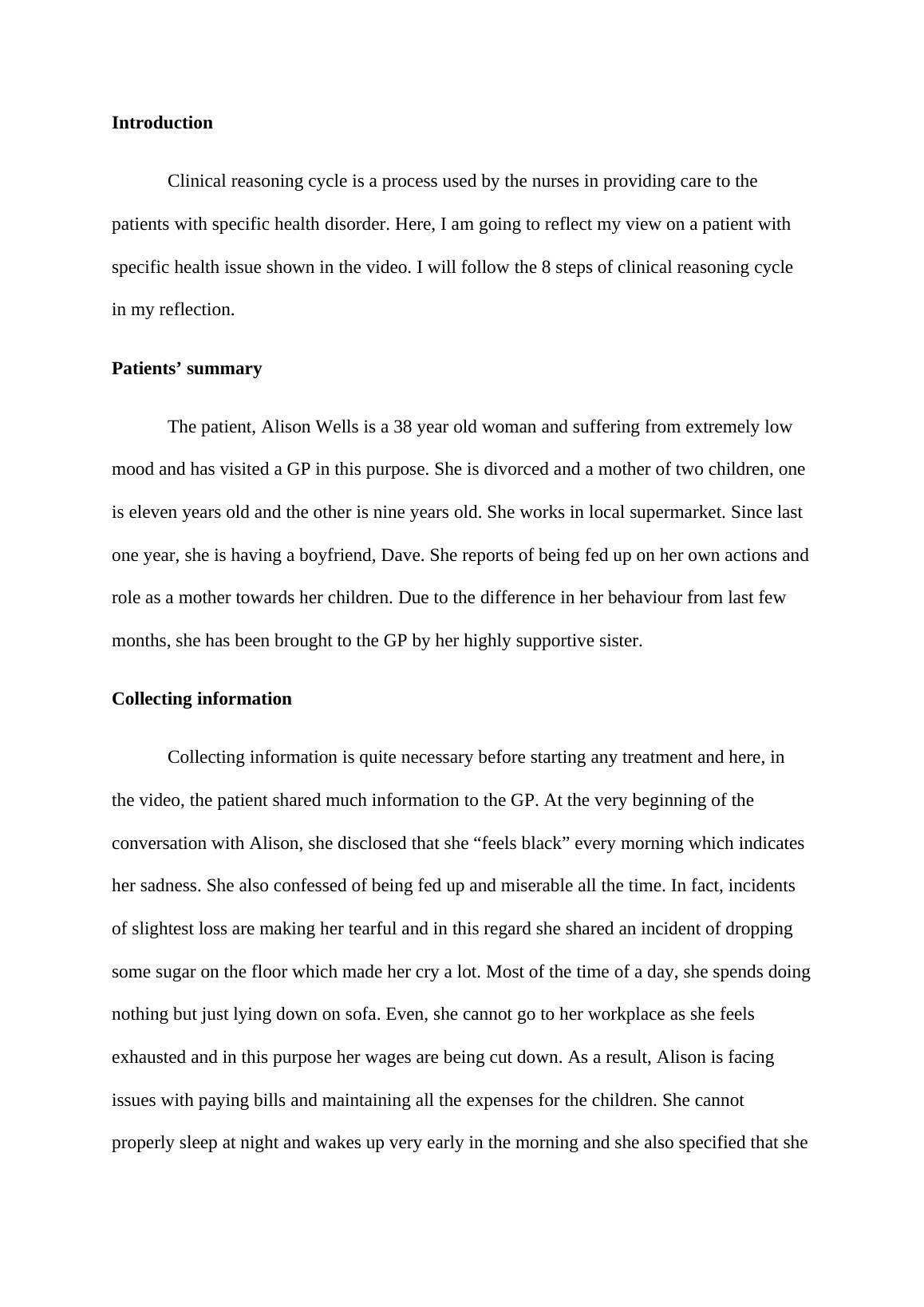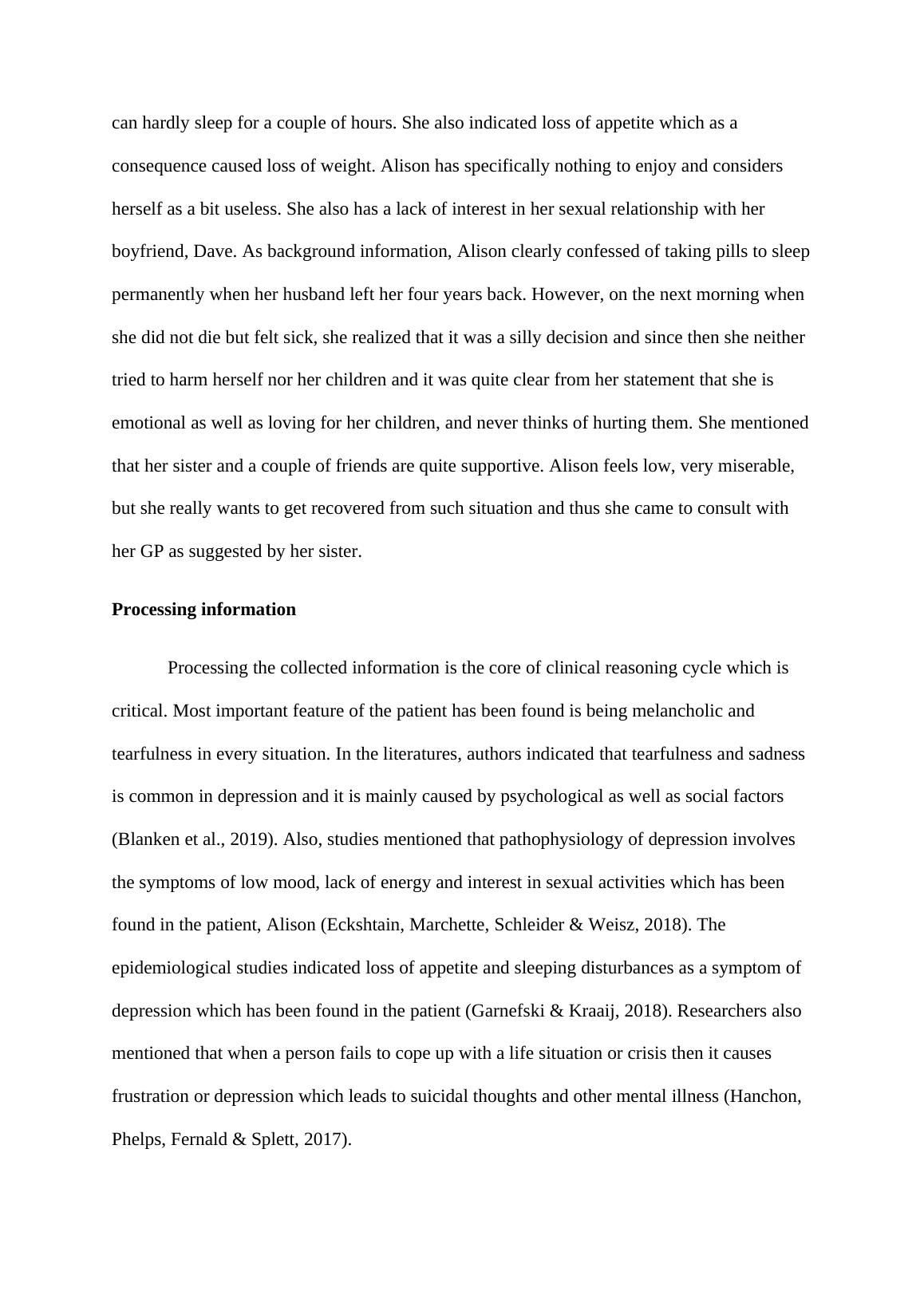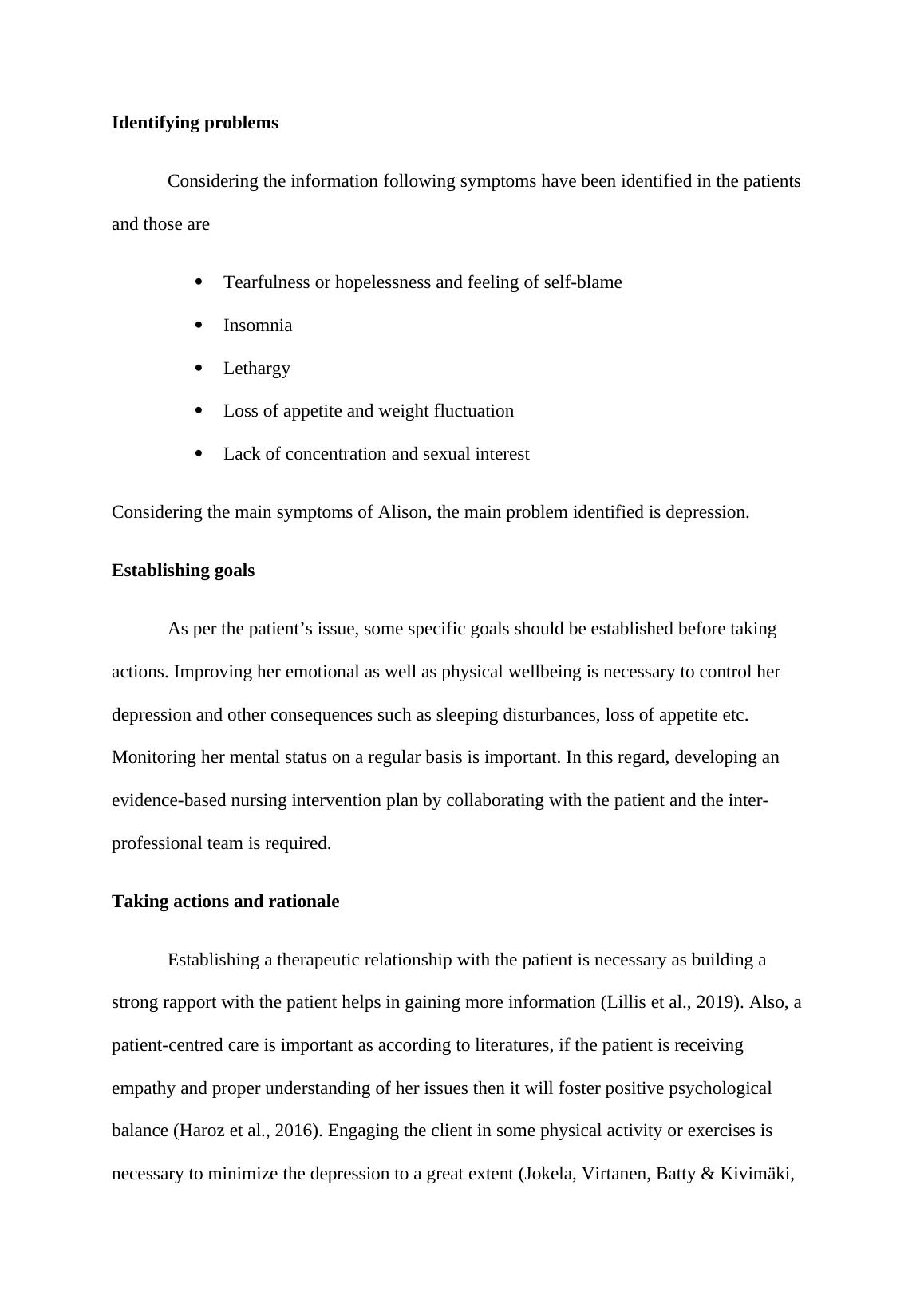Clinical Reasoning Cycle: Reflection on a Patient with Depression
Added on 2022-12-30
6 Pages1656 Words60 Views
Introduction
Clinical reasoning cycle is a process used by the nurses in providing care to the
patients with specific health disorder. Here, I am going to reflect my view on a patient with
specific health issue shown in the video. I will follow the 8 steps of clinical reasoning cycle
in my reflection.
Patients’ summary
The patient, Alison Wells is a 38 year old woman and suffering from extremely low
mood and has visited a GP in this purpose. She is divorced and a mother of two children, one
is eleven years old and the other is nine years old. She works in local supermarket. Since last
one year, she is having a boyfriend, Dave. She reports of being fed up on her own actions and
role as a mother towards her children. Due to the difference in her behaviour from last few
months, she has been brought to the GP by her highly supportive sister.
Collecting information
Collecting information is quite necessary before starting any treatment and here, in
the video, the patient shared much information to the GP. At the very beginning of the
conversation with Alison, she disclosed that she “feels black” every morning which indicates
her sadness. She also confessed of being fed up and miserable all the time. In fact, incidents
of slightest loss are making her tearful and in this regard she shared an incident of dropping
some sugar on the floor which made her cry a lot. Most of the time of a day, she spends doing
nothing but just lying down on sofa. Even, she cannot go to her workplace as she feels
exhausted and in this purpose her wages are being cut down. As a result, Alison is facing
issues with paying bills and maintaining all the expenses for the children. She cannot
properly sleep at night and wakes up very early in the morning and she also specified that she
Clinical reasoning cycle is a process used by the nurses in providing care to the
patients with specific health disorder. Here, I am going to reflect my view on a patient with
specific health issue shown in the video. I will follow the 8 steps of clinical reasoning cycle
in my reflection.
Patients’ summary
The patient, Alison Wells is a 38 year old woman and suffering from extremely low
mood and has visited a GP in this purpose. She is divorced and a mother of two children, one
is eleven years old and the other is nine years old. She works in local supermarket. Since last
one year, she is having a boyfriend, Dave. She reports of being fed up on her own actions and
role as a mother towards her children. Due to the difference in her behaviour from last few
months, she has been brought to the GP by her highly supportive sister.
Collecting information
Collecting information is quite necessary before starting any treatment and here, in
the video, the patient shared much information to the GP. At the very beginning of the
conversation with Alison, she disclosed that she “feels black” every morning which indicates
her sadness. She also confessed of being fed up and miserable all the time. In fact, incidents
of slightest loss are making her tearful and in this regard she shared an incident of dropping
some sugar on the floor which made her cry a lot. Most of the time of a day, she spends doing
nothing but just lying down on sofa. Even, she cannot go to her workplace as she feels
exhausted and in this purpose her wages are being cut down. As a result, Alison is facing
issues with paying bills and maintaining all the expenses for the children. She cannot
properly sleep at night and wakes up very early in the morning and she also specified that she

can hardly sleep for a couple of hours. She also indicated loss of appetite which as a
consequence caused loss of weight. Alison has specifically nothing to enjoy and considers
herself as a bit useless. She also has a lack of interest in her sexual relationship with her
boyfriend, Dave. As background information, Alison clearly confessed of taking pills to sleep
permanently when her husband left her four years back. However, on the next morning when
she did not die but felt sick, she realized that it was a silly decision and since then she neither
tried to harm herself nor her children and it was quite clear from her statement that she is
emotional as well as loving for her children, and never thinks of hurting them. She mentioned
that her sister and a couple of friends are quite supportive. Alison feels low, very miserable,
but she really wants to get recovered from such situation and thus she came to consult with
her GP as suggested by her sister.
Processing information
Processing the collected information is the core of clinical reasoning cycle which is
critical. Most important feature of the patient has been found is being melancholic and
tearfulness in every situation. In the literatures, authors indicated that tearfulness and sadness
is common in depression and it is mainly caused by psychological as well as social factors
(Blanken et al., 2019). Also, studies mentioned that pathophysiology of depression involves
the symptoms of low mood, lack of energy and interest in sexual activities which has been
found in the patient, Alison (Eckshtain, Marchette, Schleider & Weisz, 2018). The
epidemiological studies indicated loss of appetite and sleeping disturbances as a symptom of
depression which has been found in the patient (Garnefski & Kraaij, 2018). Researchers also
mentioned that when a person fails to cope up with a life situation or crisis then it causes
frustration or depression which leads to suicidal thoughts and other mental illness (Hanchon,
Phelps, Fernald & Splett, 2017).
consequence caused loss of weight. Alison has specifically nothing to enjoy and considers
herself as a bit useless. She also has a lack of interest in her sexual relationship with her
boyfriend, Dave. As background information, Alison clearly confessed of taking pills to sleep
permanently when her husband left her four years back. However, on the next morning when
she did not die but felt sick, she realized that it was a silly decision and since then she neither
tried to harm herself nor her children and it was quite clear from her statement that she is
emotional as well as loving for her children, and never thinks of hurting them. She mentioned
that her sister and a couple of friends are quite supportive. Alison feels low, very miserable,
but she really wants to get recovered from such situation and thus she came to consult with
her GP as suggested by her sister.
Processing information
Processing the collected information is the core of clinical reasoning cycle which is
critical. Most important feature of the patient has been found is being melancholic and
tearfulness in every situation. In the literatures, authors indicated that tearfulness and sadness
is common in depression and it is mainly caused by psychological as well as social factors
(Blanken et al., 2019). Also, studies mentioned that pathophysiology of depression involves
the symptoms of low mood, lack of energy and interest in sexual activities which has been
found in the patient, Alison (Eckshtain, Marchette, Schleider & Weisz, 2018). The
epidemiological studies indicated loss of appetite and sleeping disturbances as a symptom of
depression which has been found in the patient (Garnefski & Kraaij, 2018). Researchers also
mentioned that when a person fails to cope up with a life situation or crisis then it causes
frustration or depression which leads to suicidal thoughts and other mental illness (Hanchon,
Phelps, Fernald & Splett, 2017).

Identifying problems
Considering the information following symptoms have been identified in the patients
and those are
Tearfulness or hopelessness and feeling of self-blame
Insomnia
Lethargy
Loss of appetite and weight fluctuation
Lack of concentration and sexual interest
Considering the main symptoms of Alison, the main problem identified is depression.
Establishing goals
As per the patient’s issue, some specific goals should be established before taking
actions. Improving her emotional as well as physical wellbeing is necessary to control her
depression and other consequences such as sleeping disturbances, loss of appetite etc.
Monitoring her mental status on a regular basis is important. In this regard, developing an
evidence-based nursing intervention plan by collaborating with the patient and the inter-
professional team is required.
Taking actions and rationale
Establishing a therapeutic relationship with the patient is necessary as building a
strong rapport with the patient helps in gaining more information (Lillis et al., 2019). Also, a
patient-centred care is important as according to literatures, if the patient is receiving
empathy and proper understanding of her issues then it will foster positive psychological
balance (Haroz et al., 2016). Engaging the client in some physical activity or exercises is
necessary to minimize the depression to a great extent (Jokela, Virtanen, Batty & Kivimäki,
Considering the information following symptoms have been identified in the patients
and those are
Tearfulness or hopelessness and feeling of self-blame
Insomnia
Lethargy
Loss of appetite and weight fluctuation
Lack of concentration and sexual interest
Considering the main symptoms of Alison, the main problem identified is depression.
Establishing goals
As per the patient’s issue, some specific goals should be established before taking
actions. Improving her emotional as well as physical wellbeing is necessary to control her
depression and other consequences such as sleeping disturbances, loss of appetite etc.
Monitoring her mental status on a regular basis is important. In this regard, developing an
evidence-based nursing intervention plan by collaborating with the patient and the inter-
professional team is required.
Taking actions and rationale
Establishing a therapeutic relationship with the patient is necessary as building a
strong rapport with the patient helps in gaining more information (Lillis et al., 2019). Also, a
patient-centred care is important as according to literatures, if the patient is receiving
empathy and proper understanding of her issues then it will foster positive psychological
balance (Haroz et al., 2016). Engaging the client in some physical activity or exercises is
necessary to minimize the depression to a great extent (Jokela, Virtanen, Batty & Kivimäki,

End of preview
Want to access all the pages? Upload your documents or become a member.
Related Documents
Mental Health Assessment - Clinical Reflectionlg...
|5
|1618
|96
Clinical Reasoning Cycle, Case Study of Alisonlg...
|7
|1857
|99
Reflection on Mental Health Assessmentlg...
|5
|1552
|60
Mental Health Case Study: Symptoms, Social History, Risk Assessment, and Clinical Formulationlg...
|3
|1179
|138
Nursing Mental Healthlg...
|6
|1362
|84
Importance of Mental State Examination in Mental Health Carelg...
|6
|1490
|1
